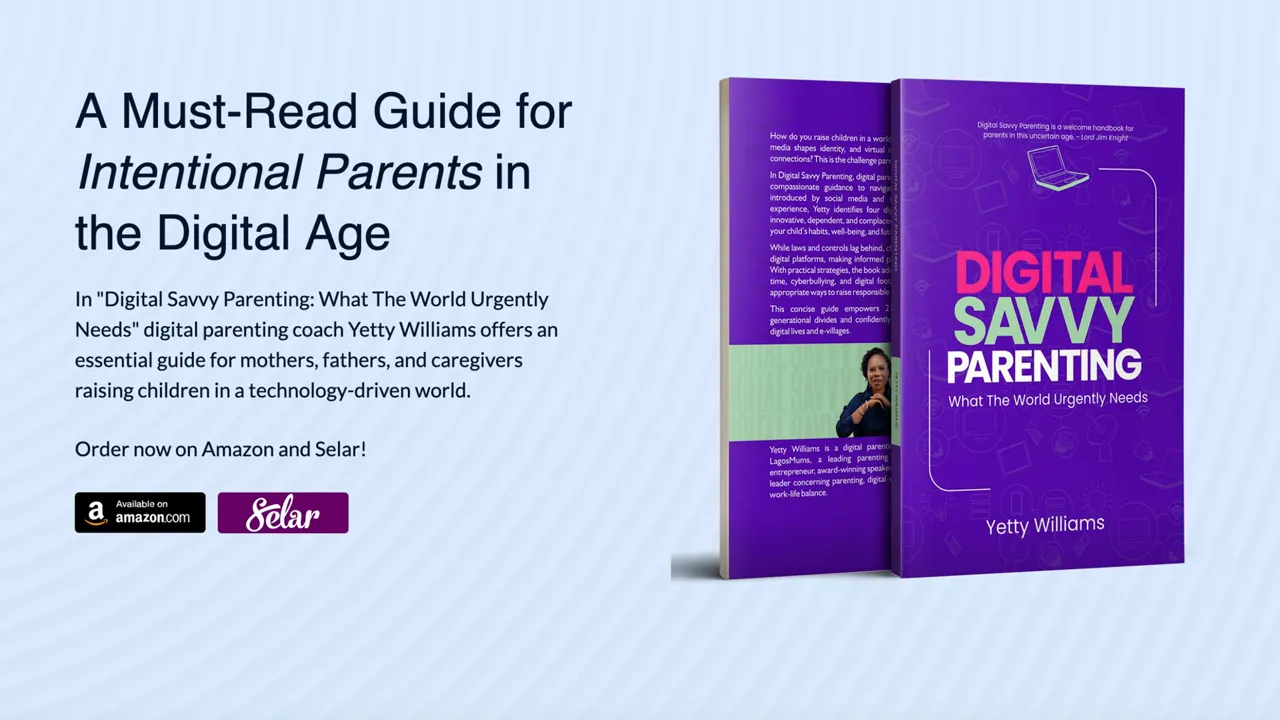Raising Smart, Safe Digital Kids in a Changing World
I was a guest on the podcast Reframe with Jade to discuss a topic central to my work: parenting in the digital age. As the founder of LagosMums, a cyberpsychology-trained digital parenting coach, and author of Digital Savvy Parenting, I spoke about how families can transition from panic and reactivity to clear, practical, and empathetic strategies that help children grow into responsible digital citizens.
Why this matters now
We are living through the Fourth Industrial Revolution, and technology is no longer a side effect of life. It shapes how children think, how they form identity, how they relate to peers, and how families interact. This is not their fault. Children did not come with built-in social media coding. They inherited a world where content, algorithms, and external validation significantly influence their development.
“If your child is on any social media platform, you should be on there. There’s no way you can speak their language if you don’t know what’s going on on those platforms that they’re spending so much time on.”
The Truth Parents Need to Know about Raising Smart, Safe Digital Kids in a Rapidly Changing World Share on X
In my digital parenting coaching practice, I use a simple framework that is easy to remember and practical to apply.
- Start by familiarizing yourself with the platforms, trends, and research. Ignorance is no longer an option; we know that being informed helps you make decisions rather than reacting out of fear.
- Become more empowered by using that knowledge to set practical boundaries and teach your child to make better choices. Knowing why you are setting a rule makes it more likely to work.
- Empathy is Critical for parents to remember that their children did not create this world; they live in it. Parents must learn to approach conversations without judgment and with curiosity about their experience.
The hidden risk most parents miss: mindset shift
Beyond obvious problems like cyberbullying and inappropriate content, there is a subtler danger: a steady reshaping of children’s mindsets. Algorithms create echo chambers. Short-form content repeatedly feeds narrow perspectives and habits. A child growing up with these inputs for two decades is being shaped in ways parents may not recognise.
Neuroscience reminds us that the prefrontal cortex matures into the mid twenties. If a child is consuming unfiltered content from age five, that content will influence emotional regulation, attention, and identity formation. Recognising that influence is the first step toward responding intentionally.
Digital parenting archetypes — which one are you?
Based on my work with thousands of families, I have identified four common approaches parents take toward digital parenting. Identifying your archetype helps you change what is not working.
- Avoidant — Pretend the problem does not exist. Hope is the strategy. This leaves children to figure things out on their own.
- Dependent — Parents mirror the digital habits they worry about. Devices become a convenient babysitter and parents model heavy use.
- Complacent — Parents know something should change, but are overwhelmed and inconsistent. Rules exist but are not enforced.
- Innovative — The goal. Parents learn the tools, set clear boundaries, and teach children to be resilient, creative, and intentional users of technology.
Take the quiz here to find out your Digital Parenting Archetype
Practical habits to shift your home from reactive to intentional
Change does not require perfect rules. Start with simple habits that the whole family can adopt.
- Do not start the day with a screen. Waking up and immediately reaching for a device primes the brain for endless content.
- Adopt a digital sunset. Turn off all devices at least one hour before going to bed, as the blue light and late-night content can disrupt sleep.
- Create digital free zones. The dinner table is a powerful starting point for everyone to put devices away.
- Match content to purpose. Video calls, creative projects, or documentaries are very different from endless short-form clips. Treat high-quality content like a meal and junk content like dessert.
- Use classic tools. If waking alarms are the reason phones are in bedrooms, replace the phone with a traditional alarm clock.
Talk about AI and digital literacy early
AI is now part of life. Children are already using generative tools, and therefore, it is essential to teach them about limitations and risks early on. Explain that AI can hallucinate and that personal data should be protected. Encourage critical thinking by regularly asking them where an answer came from, teach them to check sources, and practice creating rather than only consuming.
The African proverb that it takes a village to raise a child now has a digital counterpart. I call it the e-village. An informed AI community matters Share on XRegulation will help, but personal responsibility matters.
We will need broad regulation to protect vulnerable children. Consider the parallels with tobacco and car safety, where change took decades to implement and is often accompanied by lobbying. In the meantime, parents must act. Treat technology as powerful but neutral. If the purpose of a thing is not known, abuse becomes inevitable, and so both personal boundaries and advocacy to push for safer systems are necessary.
The Truth Parents Need to Know about Raising Smart, Safe Digital Kids in a Rapidly Changing World Share on XDigital Savvy Parenting is a practical resource.
My book, Digital Savvy Parenting: What the World Urgently Needs, brings ten years of research and coaching into a hands-on guide. Each chapter concludes with coaching prompts, allowing families to discuss and implement changes together. Couples tell me they read chapters and have real conversations that lead to new, sustainable habits. The book is available on Amazon and in the Nigerian market on Selar.
Small steps matter
Start with one practice. Pick the one that will be easiest to sustain and most likely to increase connection. Maybe it is a digital sunset or maybe it is a screen-free breakfast. The aim is not perfection but rather to foster relationships, awareness, and steady progress in raising children who can thrive in a digital world.
It is possible to be both modern and humane. Educate yourself, empower your family, and approach the digital era with empathy. Share on X
Read Also:
Effective Parenting in the E-Village
Understanding AI and the Effects on Your Children


